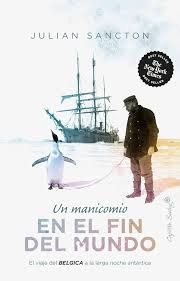
Original language: English
Original title: Madhouse at the end of the Earth: The Belgica’s journey into the dark antártica night
Translation: David Muñoz Mateos
Year of publication: 2021
Valuation: It’s very nice
Surely many of you have heard about the Endurance expedition, the one led by Ernest Shackleton and which between 1914 and 1916 experienced one of the greatest odysseys in the history of polar exploration. Now, did you know that, back in 1897-1899, an expedition “led” by the Belgian Adrien de Gerlache experienced a very similar situation (although with a before and during something different from that of the British)?
Just in case, I tell you that the Belgian expedition was an international and multidisciplinary expedition that back in the last years of the 19th century traveled to Antarctica, half with a scientific/research desire and half to enter History (with capital letters). The fact is that, for one reason or another, the kids got stuck in the Bellingshausen Sea (like Shackleton in the Weddell Sea, wow) and made the first Antarctic winter in history. In short, things began to degenerate, on a physical and mental level and… as Mayra Gómez Kemp said in Un, dos, tres (damn, what a fucking old man I am!), I can read up to here.
Be that as it may, whether you are among the “smart” or the “ignorant”, this book Julian Sancton is absolutely recommended both for being one of the very few texts in Spanish on the Belgium expedition and for its quality itself.
And there are several reasons why I enjoyed reading this book like a sparrow in a quagmire (or Weddell seals in the Weddell Sea (as long as they are not attacked by a whale)). So:
- It reads like an adventure novel. The story makes this possible, but also the structure chosen by the author contributes to this reading. The reference to a Jules Verne mixed with Edgar Allan Poe is inevitable.
- The diversity of sources, which allows an approach to history from different angles.
- The psychological aspect of the text, which does not always appear explicitly in other polar stories.
- The importance of the scientific aspect of the expedition. It is obvious that it is overshadowed by the more “adventurous” part but it had (and has) its importance and as such is reflected in the text.
- The three main characters, who are well described throughout the book: the mellifluous De Gerlache, the determined Amundsen and the versatile (and somewhat trollish) Cook.
- Its more or less introductory nature to the history of polar exploration, offering “prehistory” and short biographies of two key figures such as Cook and Amundsen.
PS: Someone publish Adrien de Gerlache’s testimony about the expedition, please!
Other books on polar expeditions reviewed in ULAD: From Greenland to the Pacific (Rasmussen), The Battle for the North Pole (Cook & Peary), Diary of the South Pole (Scott), To the North Pole by Plane (Amundsen), Pyramiden, Heroes of Antarctica, The Arctic from the Window of a Zeppelin, Alone (Byrd), Trapped in the Ice (Shackleton), Journey to the South Pole and Around the World (James Cook) and The Terror (which novelizes Franklin’s tragic expedition to the Arctic)
Source: https://unlibroaldia.blogspot.com/2024/01/julian-sancton-un-manicomio-en-el-fin.html


